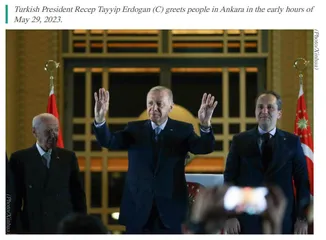Erdogan’s Election Victory and the Direction of Turkish Politics
作者: Yu Guoqing

2023 is the year when Turkish presidential and parliamentary election coincides with the centennial of the founding of modern Türkiye. After the May 14 primary election and the May 28 second round, Erdogan narrowly missed a downfall and was re-elected as President. Looking ahead, Türkiye’s basic political system is expected to remain stable, while there will be some new changes in its domestic political governance, economic policy and foreign policy.
Reasons Behind Erdogan’s Re-election
Türkiye underwent a major political reform after the 2017 constitutional referendum when it established presidential system replacing the parliamentary system. In recent years, there has been much controversy in Türkiye over the reform, and the US-led Western countries have also criticized Erdogan’s nationalistic policies. These have given unprecedented significance to the general election in May this year. Before the election, it was generally predicted that Erdogan and the opposition Republican People’s Party leader Kemal Kılıçdaroğlu would be in a neck-and-neck rivalry and the winner will secure his place by a narrow margin. Erdogan did not secure half the votes in the first round, entailing a second round of voting. On May 28, Erdogan won out with 52.18% of the vote, and there are several drivers behind his victory.
First, the Justice and Development Party (AKP) enjoys the advantage of being in power for long over the opposition party. Erdogan made full use of national resources, media, favorable electoral law and others as the incumbent President when competing with his opponents. Turkish state television spent most time putting on air the achievements of Erdogan and his party, and dedicated most of its promotion time to Erdogan and his AKP during the election.
Second, the opposition lacks politicians of sufficient weight to stand up against Erdogan. In this election, Erdogan’s major opponent is the Republican People’s Party leader Kılıçdaroğlu, who is 74 years of age, and described as “a bureaucrat who lacks charisma or eloquence”.
Third, the further division among the opposition parties after the first round of voting has strengthened Erdogan’s hand. Sinan Oğan, who came third in the first round was named by media the “kingmaker” of the election. As the leader of the far-right Nationalist Movement Party, Oğan pledged his endorsement of Erdogan ahead of the second round of voting, which was seen as one of the key factors in Erdogan’s second-round victory.
Fourth, the Turkish public and voters generally recognize the achievements Erdogan has made in his tenure. In his 20 years in power, first as Prime Minister and then President, Erdogan has reshaped Türkiye’s political landscape and its role in global affairs. Under his helm, Türkiye becomes a regional power with its overall strength significantly enhanced, and its composite economic strength ranks among the top 20 in the world. Türkiye’s Daily Sabah believes that, Türkiye has become a regional economic power and a global political power.
The Challenges Facing Türkiye’s New Government
Although Erdogan won the re-election as he wished, the victory was against the background where Türkiye has experienced economic turbulence in recent years, aggravated by the worst earthquake in decades in early 2023. Erdogan is bound to face many challenges.
I.Political Challenges Remain Severe
Although Erdogan won out at last, there has always been controversy in Türkiye over the election and the presidential system he himself pushed for, which accounts for a major challenge for Erdogan after the re-election. The opposition sees presidential system as a threat to democracy and human rights as it weakens parliament, concentrates unproportionate power in the hands of the President, undermines the authority of local governments, sabotage judiciary organ, and leads to an increase of migration and capital flight. In the context of the ruling party’s identity politics, the AKP amended the constitution, reorganized the government, and weakened the political influence of the military during its reign, which “severely squeezed the political space of the opposition parties and gradually erodes the space for their political participation.”
In this election, opposition parties across the ideological spectrum were united by the common goal of anti-Erdoganism, which directly resulted in less than 50% of the vote for Erdogan in the first round. As opposition parties have been working to cripple President’s power, Erdogan in his new term will have to face up to the task of persuading the parliament and boosting public confidence in the fundamental political system of Türkiye, reducing political strife, and putting national development over political party competition, in order to promote stability and development in Türkiye.
II.Economic Growth Remains an Arduous Task
Since coming to office in 2002, the AKP-led Turkish government has achieved remarkable economic growth through credit expansion and foreign investment attraction. Yet since the currency crisis in 2018, Türkiye has experienced contracted economic growth and runaway food price, resulting in high debt in private sector, high inflation, and high unemployment. Right now Türkiye’s economy faces two serious problems. First, the trade deficit in foreign trade has been in large volume for a long time, with the figure in 2022 reaching $109.539 billion US dollars, an increase of 137% year on year. Second, due to long-term dependence on foreign funds for economic development, the scale of foreign debt is magnificent, with the total foreign debt of the central government reaching 2.12 trillion lira by the end of 2022. The problems lead to Türkiye’s increased dependence on foreign currency and foreign capital, which adds to the instability of its capital market. Had a major event occurred, Turkish currency is prone to spill over and foreign capital will retreat. Under the presidential system, Turkish President has the power to appoint central bank governor. In 2019, after the Erdogan government dismissed four insubordinate central bank governors in succession, it pursued anti-marketized and unconventional low interest rate. In this context, the new Erdogan government must think first and foremost how to bring Türkiye out of the current economic predicament.